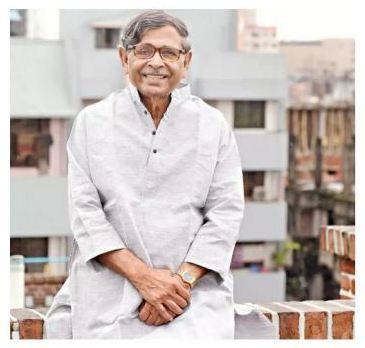
Abdullah Abu Sayeed, the torch-bearer who has kindled the flame of knowledge for decades, turned 77 on 25 July. In an interview with Prothom Alo, the erudite man shared his thoughts about literature, writing, Alor Iskool and other aspects of his life. The interview was taken by journalist and writer Anisul Haque.
Anisul Haque: Sir, you turned 77 yesterday. A long life is an achievement in its own. What would you say?
Abdullah Abu Sayeed: It reminds me of a piece by Cicero - living is an achievement and so is getting old. A human earns knowledge, wisdom and information in the process of aging.
In another word, being old is what human beings dream of throughout their lives.
Anis: It feels good to reminisce about the past as we age. Do you think your young days were better than that of the youth these days?
Sayeed: No. I haven’t thought that for a single moment. If you live your life everyday, new experiences are sure to come, and you embrace them. When you wake up to face a new world with all your curiosities intact, you are one of the new generation. You have to live in the present, not the past. Those who can’t stop talking about past have stopped living a long time ago.
Anis: You once said your youth keeps coming back to you. When you brought out Kanthaswar, when you set up Bishwa Shahitya Kendra (BSK), when you were involved in the environment movement, you regained your youth. What gives you your youth today?
Sayeed: Earlier I used to pay my undivided attention into one sole project at a time. With age and wisdom, now I can do many things at once and gain joy from how each of them enrich me. Still, writing gets my undivided attention at most times.
Anis: You often said you have become so many things in life except a writer.
Sayeed: By that I meant I could not pen out the directions my heart took me. I couldn’t author a novel, a story, or an article yet.
Anis: What are you writing now?
Sayeed: The story of Bishwa Shahitya Kendra is still unwritten, so I am penning down the struggle BSK went through since its inception. I am writing fiction as well, but I’m having a tough time. I am a detail-oriented person. I could have put a full stop of my autobiography on page 300, but I couldn’t filter out specific moments from my life to be a part of that book. So, I included everything, and the book turned out to be 1800 pages .
Anis: We consider label writing as highbrow literature.
Sayeed: Detailing does not mean filling up the pages with garbage. I think a person’s intellect reflects on his detailing ability. For example, I read Meghnadbadh Kabya a few days ago, and I was awestruck by its ability of conveying so much information within so few words.
My first piece of fiction ended in 35 pages. People say it has turned into a novel. I realised, a lot of my short stories are indeed long stories. I think if I want to depict a detailed scene I need to bring up a lot. May be I could have become a novelist, but I don’t think I have that ability anymore.
Anis: I think contemporary is been simplified as compared to the past. We no longer get the satisfaction we used to get from Rabindranath Tagore, Buddhadeb Basu, or Promoth Chowdhury’s writing. However, your writing is filled with modernism, contemporariness and elements of classics.
Sayeed: We are going through restless times. We want to simplify everything, but we are losing the aesthetic appeal of prose in the process. However, I think contemporary writers are capable of producing quality work.
Anis: You have brought books close to several generations. Time and again, you focused on enlightenment of human beings through various projects. Nowadays you have devoted your time in Alor Iskool. Share your dreams about Alor Iskool (School of Light).
Sayeed: Although people have categorized knowledge into various sections, as a concept, knowledge is one. It had to be categorized because of its vastness. Compare it with a train. One train has many compartments because it has to carry so many people in one go.
One day I thought of whether I could do something to make people understand that all the branches of knowledge lead to one destination. For instance, why do we get spellbound by a moonbeam? Why do the trembling leaves of a tree move us? It is because we all stem from one root- nature, and that why we are forever intertwined.
We want the members of Alor Iskool to be complete human beings by attaining total knowledge. We want them to explore various avenues of knowledge and eventually settle into one. Alor Iskool offers about 70 courses on different arenas including arts, philosophy, sociology, science, politics, economics, and poetry.
Anis: Do you think you journey has been accomplished? Have you have reached the peak of your Everest and now it is time to descend?
Sayeed: I believe everything needs a pause. Now I want to focus on my writing. So my writing and Biswa Shahitya Kendra are in for a face-off!



